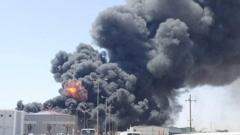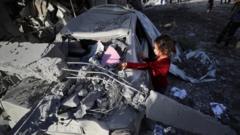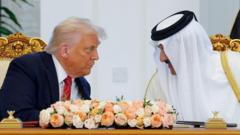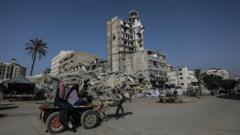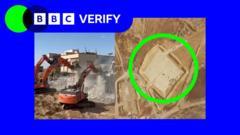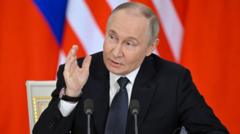The president emphasizes regional autonomy during his diplomatic venture, alongside significant business agreements.
Trump Proclaims Shift in U.S. Policy During Middle East Tour

Trump Proclaims Shift in U.S. Policy During Middle East Tour
In a bold proclamation, President Trump declares the end of U.S. intervention in the Middle East.
President Trump commenced an ambitious four-day diplomatic tour of the Middle East this week, marking a striking departure from traditional U.S. foreign policy. As he addressed an audience in an opulent Saudi Arabian ballroom, Trump declared that the U.S. would cease its practices of nation-building and foreign intervention. "We are done with lecturing others on how to live," he stated, pressing the region's leaders and citizens to shape their own futures.
The immediate fallout from Trump's speech was palpable, eliciting varied reactions throughout the Middle East. Complementing his political overtures, the President's tour also foregrounded economic discussions and potential business ventures, including a notable agreement between Qatar Airways and Boeing for the purchase of 210 jets. This partnership symbolizes a deepening cooperation between the U.S. and the Gulf nations, with defense agreements between Qatar and the U.S. underscoring a renewed focus on military partnerships.
Adding a historic dimension to his travels, Trump met with President Ahmed al-Shara of Syria—the first encounter of its kind in 25 years. Trump was effusive in his remarks about al-Shara, describing him as a "fighter" with a "strong past." This surprising acknowledgment of the Syrian leadership might signal new diplomatic pathways in a region long marked by conflict and estrangement.
However, amidst the backdrop of these overtures, violence continued to erupt in the occupied territories. Reports emerged of significant casualties resulting from Israeli airstrikes in Gaza, raising ongoing concerns about regional stability and the humanitarian crisis affecting millions.
As the world watches this historic diplomatic journey unfold, the question remains: What will the long-term implications be for U.S. relations in the Middle East following this transformative visit?
The immediate fallout from Trump's speech was palpable, eliciting varied reactions throughout the Middle East. Complementing his political overtures, the President's tour also foregrounded economic discussions and potential business ventures, including a notable agreement between Qatar Airways and Boeing for the purchase of 210 jets. This partnership symbolizes a deepening cooperation between the U.S. and the Gulf nations, with defense agreements between Qatar and the U.S. underscoring a renewed focus on military partnerships.
Adding a historic dimension to his travels, Trump met with President Ahmed al-Shara of Syria—the first encounter of its kind in 25 years. Trump was effusive in his remarks about al-Shara, describing him as a "fighter" with a "strong past." This surprising acknowledgment of the Syrian leadership might signal new diplomatic pathways in a region long marked by conflict and estrangement.
However, amidst the backdrop of these overtures, violence continued to erupt in the occupied territories. Reports emerged of significant casualties resulting from Israeli airstrikes in Gaza, raising ongoing concerns about regional stability and the humanitarian crisis affecting millions.
As the world watches this historic diplomatic journey unfold, the question remains: What will the long-term implications be for U.S. relations in the Middle East following this transformative visit?





